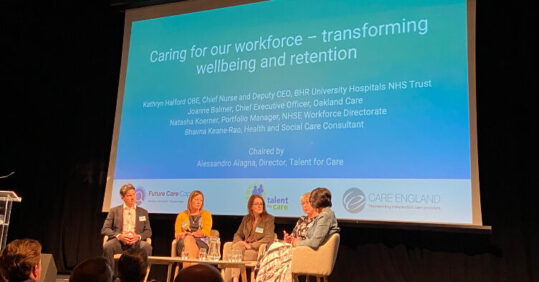Technology is ‘the way forward’ for social care, says expert panel

As the Government announces a drive for the ‘digital transformation’ of social care, a panel of experts has said that technology will be vital to the future of the sector and the workforce.
Speaking at a panel on wellbeing and retention last Thursday (18/05), health and social care consultant Bhavna Keane-Rao said that technology and AI would be ‘the way forward’ for the sector.
‘I think we don’t use technology and AI in the way that we should,’ Ms Keane Rao told the Health and Social Care Workforce: Wellbeing, integration and sustainability conference, adding ‘It is a genie that’s out of the bottle and we’re going to have to deal with it’.
The comments came as the Department of Health and Social Care (DHSC) announced new guidance for digital skill development and digital transformation in the health and social care sector.
Related Article: England’s CNO to launch nursing strategy ‘later this year’
The new Digital Skills Framework aims to provide a structure in which new digital skills can developed by social care workers in order to ‘ensure innovative technology is being put to the best possible use to enhance care’.
According to the DHSC, this includes training on how to make use of virtual care centres, implement AI monitoring technology, and to ensure that residents GP records can be accessed by care professionals.
Minister for Social Care Helen Whately said that implementing more advanced technology could ‘increase the time that care workers spend with the people they care for’.
Speaking last week, Ms Whately added that the guidance and standards ‘will give social care staff the support they need to improve their digital capabilities’.
Joanne Balmer CEO of Oakland Care, an independent care home operator in the South East of England, told the panel that innovative technology is improving sustainability and freeing up time for staff.
Ms Balmer said that the use of robotics ‘frees up time for the staff to be able to do more hands-on care, more engagement, and more interaction with residents’.
Related Article: More nursing apprenticeships and changes to student travel expenses
Likewise, Ms Balmer says that the use of Bluetooth-enabled incontinence products ensures that staff aren’t ‘spending time taking people for care interventions that they don’t necessarily need and they’re using their time more effectively’.
The panel also discussed how technological innovations and better training could improve flexibility for staff which could help improve the sector’s turnover rate.
Kathryn Halford, chief nurse and deputy CEO at Barking, Havering and Redbridge University Hospitals Trust, told the panel that Covid forced social care providers to start ‘thinking differently’ about the workforce.
Ms Halford said that staff polls and a focused team to support nurses had reduced the first-year turn-over rate of staff from 24% to 4%.
Related Article: Nurses given ‘range of leadership opportunities’ in NHS 10-year plan
However, Ms Halford cautioned: ‘We can’t expect people to continue working like they have been working, if we keep doing the same thing, we’re going to get the same result.’

See how our symptom tool can help you make better sense of patient presentations
Click here to search a symptom




